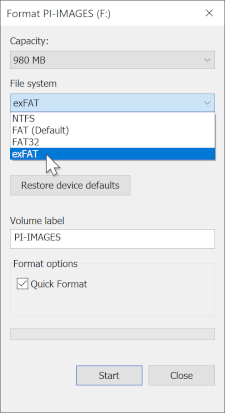exFAT
Stands for "Extensible File Allocation Table."
exFAT is a file system designed for removable flash drives. It allows for larger file sizes and storage volumes than FAT32. Most operating systems, game consoles, cameras, and other devices support exFAT, making it a cross-platform file system. It is the default file system for SDXC cards and many USB flash drives.
FAT file systems like exFAT utilize a file allocation table, an index file that tracks the files stored on the disk volume. The file system creates this table when a disk volume is first formatted, then adds and removes entries as files are made, edited, and deleted. The FAT32 file system is limited to a maximum file size of 4 GB and volume size of 2 TB; exFAT uses a different file allocation table design that instead supports file and volume sizes up to 128 PB (or more than 128 million GB).
While it supports hard disk drives, exFAT is primarily designed for removable flash drives, giving it advantages over other file systems when used for portable media. It is supported by multiple operating systems, as well as game consoles, cameras, and many other devices. NTFS, for example, is only supported by Windows, while APFS and HFS are only supported by macOS. Those file systems also have more advanced features like journaling, permissions, and encryption that add overhead and require more computational resources when compared to lightweight FAT file systems.
 Test Your Knowledge
Test Your Knowledge